- Home
- Lisa Wingate
Dandelion Summer Page 15
Dandelion Summer Read online
Page 15
I watched them show Johnny how to blow across them, sending the little soldiers skyward with their miniature canopies of silk.
I wanted to rip every last seed head from the yard, grind all of them into dust so that no one could play with them, so that no one could laugh, and run, and make noise.
I felt Cecile’s gaze upon me, and I turned my attention her way. Her dark eyes narrowed and her wide lips pursed. The angle of her head was thoughtful, pensive, wary. Her gaze moved to the house, sweeping upward, reflecting brick and stone and sky. On the second story, she paused and honed in, then quickly looked away.
I turned to check over my shoulder. A woman was in the window, a filmy white nightgown outlining her breasts, draping off one thin shoulder. A slip of red hair fell over her cheek, and she pushed it aside with the back of her wrist.
She looked down at me. I turned away. I let my arm fall to my side. I stopped rubbing it. I didn’t want anyone to see.
It would only cause more pain. More fighting . . .
I woke from the dream with a familiar ache. There are some old fractures here, a doctor had told me while reading my X-rays after a minor car accident in college. He’d been surprised to find evidence of an injury from long ago. There’s some damage that never healed properly. Any idea why?
None, I’d said. My mother had always been meticulous about shots and doctor visits, protective to the point of not allowing me beyond the yard fence when I was a boy. She’d never mentioned my having broken an arm when I was very small. I didn’t recall having broken an arm.
The doctor tilted his face toward the X-ray again. Hard to believe that. This must have been quite painful. Shaking his head, he turned off the light.
Maybe I blocked it out, I said flippantly, and laughed it off. At the time, I had no memory of holding my arm that day in the yard while the girls played with dandelions. Strange that I remembered it so clearly now.
How is it possible to find a part of the past that was never there before?
The question haunted me as I went to the kitchen for coffee. It was warm and ready, thanks to the timer on the pot—one of those many modern conveniences for which I should have been grateful. Still, I missed the days when the sun rose to the sound of Annalee’s slippers in the kitchen and the percolator belching, draining, belching again. The mornings had a rhythm then, the sense of a life building toward something, brewing like the coffee in the percolator, giving off a tantalizing aroma.
Now the coffee brewed quickly, and the morning’s aroma was stale.
I’d never realized the difference until now, hadn’t given a conscious thought to Annalee’s morning sounds, but the memory was there nonetheless. An unexamined fragment, until this moment. It is possible, I concluded, to lose a bit of life—a moment, a sensation, a memory—for it to lie trapped like a bit of paper along the curb of a walking path. A stiff wind passes and it suddenly tumbles free, drifts past your eyes, so that you see it now.
Gazing through the window into the yard, I noticed for the first time that dandelions had sprouted near Annalee’s bird feeders. Like my memories, they seemed to have appeared overnight, but in reality, they’d been growing for a while. Beneath the surface, the roots were deep.
I heard the water running upstairs and my mind hiccuped. Someone was singing, a girl’s voice. For an instant I was lost in time, and Deborah was upstairs, dressing for church. Any moment now, Annalee would come around the corner on her way to force Roy from his bed and into the Sunday clothes he didn’t want to wear.
I turned and checked the coffeemaker. Modern, sleek, with a digital clock on the front. Deborah and Roy weren’t upstairs.
A melancholy fell over me, but then I recalled Epiphany and our mission, and life spiraled back to order. She came loping down the stairs a few minutes later, bounded through the living room and slid around the corner into the kitchen, dark hair bouncing in a ponytail of long spirals, her eyes wide and full of excitement. “You’re gonna be so glad you said I could stay last night.”
“And why would that be?” I did my best to affect the look of a curmudgeon. I couldn’t, after all, be giving off the impression that last night’s arrangements implied a repeat invitation.
“Just guess,” she chirped.
“I couldn’t begin to.”
“Oh, come on, J. Norm, be a little fun for once.” Without hesitation, she helped herself to a mug from the cabinet and poured a cup of coffee, then added sugar and milk.
“Fun?” Her enthusiasm traveled on the coffee fumes, slipping up my nose like an infectious disease. I snorted, tried to rub it away. “Fun isn’t the goal. This is a working arrangement, after all. What is fun about digging around in an old man’s attic?”
Opening the refrigerator again, she leaned down and looked inside, splaying her lanky legs like a colt trying to reach fresh grass. “It’s fun when you find something.” She opened and closed a drawer. “You got anything here for breakfast?”
“I don’t like breakfast.”
She blew out a laugh. “Why doesn’t that surprise me?” Shrugging, she pulled out a loaf of bread and set it on the counter. “Fine, then, I’ll just sit here and I won’t even tell you what I found last night. Just about broke my neck getting it out, but that’s okay. If you don’t wanna know, then I’ll make me a piece of toast and go watch some cartoons. Same difference to me.”
“It’s an oxymoron—same difference. Things are either the same or they’re different.”
Sighing, she pushed the bread aside. “How come you do that?” Her attention turned my way. “Argue about everything? Act hateful.”
It was a fair question, one for which I did not have a good answer. “It entertains me.”
My reply elicited a one-sided smirk. “Yeah, well, then you need to get a life.”
“I’ll take that under advisement.” I waited for her to tell me what she’d found upstairs, but she returned to making toast, ignoring me completely. Finally she smacked the butter knife down so hard that it rang against the plate. “Geez, J. Norm, are you gonna ask what I found upstairs or not?”
“I supposed you’d tell me soon enough,” I answered, disproportionately triumphant.
Snorting, she leaned over her folded arms. “I found a trunk. Another one, just like the one with all the magazines in it, only smaller.” Her hands flipped through the air, the palms turning upward. “What can I say? I am goo-oo-ood.”
“I couldn’t agree more,” I answered, and was out of my chair in a whistle.
In short order, we were in the second-story hall with the trunk and a toolbox. We’d lowered the trunk down the attic stairs using a rope and pulley—rather ingenious, if I do say so myself. The lock was a more complicated matter, however.
While I went to work with a screwdriver and an ice pick, Epiphany chewed a fingernail. “If it’s more magazines and junk, I’m gonna snatch somebody’s hair out.”
Anticipation filled me, seeming almost overwhelming. “Well, not mine, please. I haven’t much left.”
She jittered impatiently, leaning closer as I managed to trip the lock and prepared to throw open the lid. “Ten . . . nine . . . eight . . . seven . . . six . . . five . . .”
But as the trunk began to creak open and the odor of must and yellowed paper wafted into the hall, Epiphany grabbed my arm. “Ssshhh! J. Norm, hold still.” She cocked an ear toward the stairway, as if she’d heard something. A moment later, I caught it, too. The sound of the front door locks turning, then the door colliding with the security chain. “Deborah!” I whispered, and Epiphany nodded. I stood up and started down the stairs. “Drag that into Roy’s room and stay there with it.” I pointed down the hall. It was too early to explain Epiphany’s presence here on a Sunday, and most certainly I couldn’t let Deborah know that Epiphany had been here overnight. Deborah would be suspicious, concerned that I was getting in over my head, letting myself be taken advantage of. She’d feel the need to involve herself, perhaps discuss the issue with Epiphany’s moth
er. My best hope was to be as agreeable as possible and send Deborah on her way quickly.
I descended to the entry, surprised to find that the door had been pulled to, and Deborah was no longer trying to breach the security chain. Perhaps she’d decided to come in through the garage. Moving to the parlor window, I pulled the sheers aside. A car was rolling up to the curb out front—the older-model sort that didn’t belong in this neighborhood, and Deborah had started across the lawn. From her body language, it was clear that the driver had called her over.
A young man with some sort of scarf tied around his head leaned out the car window and flipped a hand haughtily toward the house, as if he were demanding information. Deborah, being Deborah, undoubtedly answered him curtly, then pointed toward the street in a way that indicated he should move along now. She glanced toward her vehicle in front of the garage, where my math professor son-in-law, a laid-back fellow not given to unnecessary socializing, appeared to be unbuckling his seat belt. My daughter was a confident woman, accustomed to ruling over college-age research assistants and graduate students, but even Lloyd recognized that neither this young man nor his behavior belonged here.
Lloyd opened his car door as Deborah pointed toward the street, telling the young man in the car once again that he should move on. Finally, he withdrew through the window, then slung something out. It skittered across the driveway, and he bade it farewell with an obscene hand gesture before leaving the premises with a squeal of tires. On her way back to the house, Deborah scooped up his discard, and I recognized it as Epiphany’s backpack. Clearly the boy in the car was the infamous DeRon, and he hadn’t come to apologize.
I unlocked the front door and let Deborah enter on her own. Lloyd, who had probably intended to wait in the vehicle, followed her into the house. He hovered in the living room doorway, seeming wary of potential family drama as Deborah dropped the backpack on the sofa. “How late did your little helper stay last night?”
“Why do you ask?” I replied, and then exchanged morning pleasantries with my son-in-law.
Deborah’s brow furrowed. “Well, apparently Epiphany didn’t come home last night. There was someone . . . either a brother or a boyfriend outside just now, looking for her. He wasn’t very nice about it, and he didn’t want to take no for an answer. Sounds to me like she’s in some sort of trouble.”
“I’m sure she’s fine.” I rushed the words out, and then realized they sounded callously unconcerned. “Undoubtedly, she stayed over with a friend and forgot to leave word. You know how teenagers can be.”
Deborah rubbed her arms, and I could see the wheels turning. She was thinking that this arrangement with Epiphany might not be a good idea any longer. “You didn’t see the way that boy was acting out there. If she has . . . issues, I don’t want her here.”
I shifted quickly to damage control. “Nonsense. She’s been very reliable. She already called this morning to confirm that she was coming again today to work on her school project. She’s writing about the rocket launches. She’ll be here later this morning.”
Deborah smacked her lips irritably. “You’re going to church with us today, remember? They’re having a special luncheon after the service. They’re dedicating the paving stones in the memory garden, including Mom’s.” Since Annalee’s death, Deborah had become a regular in church again, and active in the project of paving the sidewalks in the memory garden with stones dedicated to members who had passed on. Deborah felt she owed this to her mother, I supposed, as Annalee had always been the driving force behind our involvement with the church. Annalee would patiently endure my long work hours and the months I was away in foreign countries, but she would not stand for taking the Lord’s name in vain or missing service on Sundays. These days, I could not bear to set foot in that place without her, and in truth, God and I didn’t have much to say to each other. We’d ceased to be on speaking terms. Aside from that, Deborah’s foremost mission on any trip out of the house was to drag me by the Villas.
“You and Lloyd go ahead without me. I’m not up to it today.” I turned away to avoid seeing her disappointment. She was proud of the memory walk project, of course.
“I knew I shouldn’t have bothered.” Deborah’s words were sharp edged and bitter. In the doorway, Lloyd winced and looked at his feet.
“I’ve had a difficult night,” I added, attempting to soften my posture a little. “It isn’t a good time.”
“It never is.” She proceeded toward the door, her dress shoes clicking across the entryway in a rapid tattoo. Lloyd gave me an apologetic look.
“Tell her I’m sorry. I simply don’t feel well,” I said, a damper falling on the morning. Why was it that Deborah and I could never avoid treating each other badly, nipping from opposite sides of the fence?
“I will.” Lloyd said good-bye and followed Deborah out the door.
After they were gone, I proceeded upstairs and tried to leave the trouble with Deborah behind me.
Epiphany was sitting in my office, doodling on a notepad. She angled a frown my way. “She left kinda quick. What’d she want?”
“To drag me off to church,” I answered, the sour mood clinging to me, flavoring everything.
“You could’ve gone. I would’ve waited.”
“I have no desire to go,” I said, surprised that Epiphany’s mind wasn’t squarely on the trunk. “Next thing, those people would begin coming around with casseroles and inviting me to domino games again. I don’t want the bother of it.”
Epiphany responded with a sardonic look. “Geez, J. Norm. People are just trying to be nice. You might try being nice back once in a while.”
“I think I’m beyond needing the counsel of a sixteen-year-old.” The comment was harsh, and I regretted it, but couldn’t bring myself to say so.
“You know . . . whatever.” Setting down the pen, she stood up behind the desk. “But I’m not the one going around with some big ol’ frown on my face, hating everybody. Maybe you’d be happier if you’d eat a few casseroles and go to some domino games. Just sayin’.”
“I’ll renew my attendance in a house of worship the day they wheel me through in a coffin.” The words were meant to shock the conversation to a standstill. Deborah would have found them horrifying, but Epiphany only scoffed under her breath, as if she knew I hadn’t the courage to face my own death when the moment came.
“Seems like that’s a bad time to start back to church,” she said blandly.
Any appropriate retort escaped me. “I’ll thank you to stay out of my personal life.”
“Pppff!” She rolled her eyes. “What personal life?”
“There is a history between Deborah and me that you know nothing about,” I countered. Deborah had been heaping her resentments upon me for as long as I could recall. She blamed me for ruining her life, for being indirectly responsible for Roy’s death and Annalee’s, for moving the family to Dallas when Deborah was fifteen and forcing her to leave behind her friends, for her difficulty forming lasting relationships with men, for the fact that she’d devoted herself to work rather than having a family, for her struggle with a midlife marriage. Every problem in her life hailed back to my inadequacy as a father. It was all my fault.
Never once had she been the least bit grateful for the sacrifices I’d made, for the work I did to provide a comfortable future for her—good neighborhoods, private lessons, expensive schools, clothes, and cars, and country club memberships. A man sacrifices his life for those things, and then everyone criticizes him for it.
“Sure, whatever.” Epiphany looked away, her smile dimming. I’d wounded her this time.
Silence fell over us, and the office seemed claustrophobic. I felt compelled to say something. “Did you hear Deborah when she came in? That boy, DeRon, was outside. She saw him.”
Epiphany’s eyes widened, her mouth falling open. Her hand slid upward unconsciously, touched the place where the strap was missing on the shirt underneath the one that was Annalee’s. “DeRon was here? What d
id he want?”
“You,” I replied. “It would appear that he went by your home last night looking for you.”
Slapping a hand to her stomach, she clenched her fingers over the shirt and turned her attention to the street outside the window. “He knows I didn’t go home. . . .”
“It’s a good thing you didn’t,” I pointed out. “I don’t like the look of him—the way he acts, the way he behaved toward Deborah. In front of my home, no less. He has a nerve coming here, making demands. I think we should have the police go by and give him a talking-to.”
“No!” she snapped almost before I could finish the sentence. “Leave it alone, all right? You’ll make it worse.”
“I don’t see how putting the boy on notice can be a bad idea. He should understand that such behavior won’t be tolerated—that other people know about it, and aside from that, a bully doesn’t operate well in the light of day.”
She faced me, her lips tight with fury. “I said no, all right? Just leave it alone. I got a personal life, too, all right? I can take care of myself.” She picked up the piece of paper and pitched it in the trash. “Let’s just go open the stupid trunk.”
“All right,” I agreed, but the problem of DeRon remained in the corner of my mind like a spider on a web as we proceeded to Roy’s room. Epiphany moved to the trunk, placing her hands on her hips with an impatient expression. I remembered Deborah, a little girl with a big mind, stomping her feet and assuming the same stance, her hair bouncing from side to side as she directed her brother in games of playing house, or Simon Says, or freeze tag. It was no wonder she was successful in her career. She’d determined herself ruler of the world from the very start. In the wake of the thought came a sensation of profound emptiness. Why were those memories usually so far away from me? Why was it so much easier to see the bitterness between us, the same resentments, stale and musty like the air rising from the old trunk as I lifted the lid?
Epiphany leaned over my shoulder, fanning her nose as the contents came into view. A tattered quilt lay on top—a baby quilt made of blocks embroidered with terrier puppies in faded blue and red. I slid a hand over the fabric, felt its crusty threads beneath my fingers.

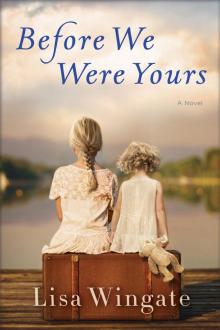 Before We Were Yours
Before We Were Yours A Sandy’s Seashell Shop Christmas
A Sandy’s Seashell Shop Christmas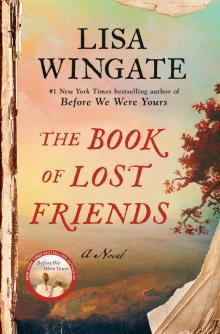 The Book of Lost Friends
The Book of Lost Friends Larkspur Cove
Larkspur Cove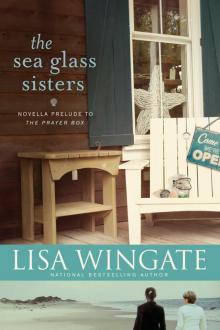 The Sea Glass Sisters
The Sea Glass Sisters The Language of Sycamores
The Language of Sycamores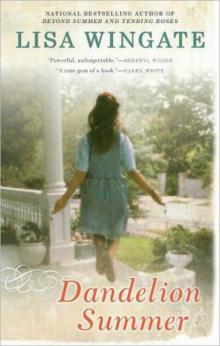 Dandelion Summer
Dandelion Summer Word Gets Around
Word Gets Around Beyond Summer
Beyond Summer Firefly Island
Firefly Island The Tidewater Sisters: Postlude to The Prayer Box
The Tidewater Sisters: Postlude to The Prayer Box Talk of the Town
Talk of the Town![Blue Sky Hill [01] A Month of Summer Read online](http://i1.bookreadfree.com/i1/03/29/blue_sky_hill_01_a_month_of_summer_preview.jpg) Blue Sky Hill [01] A Month of Summer
Blue Sky Hill [01] A Month of Summer A Thousand Voices
A Thousand Voices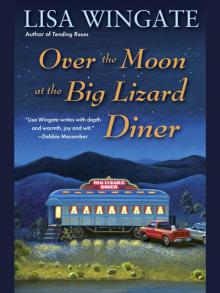 Over the Moon at the Big Lizard Diner
Over the Moon at the Big Lizard Diner Never Say Never
Never Say Never Good Hope Road
Good Hope Road The Summer Kitchen
The Summer Kitchen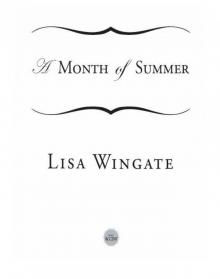 A Month of Summer
A Month of Summer Blue Moon Bay
Blue Moon Bay Drenched in Light
Drenched in Light The Sea Keeper's Daughters
The Sea Keeper's Daughters